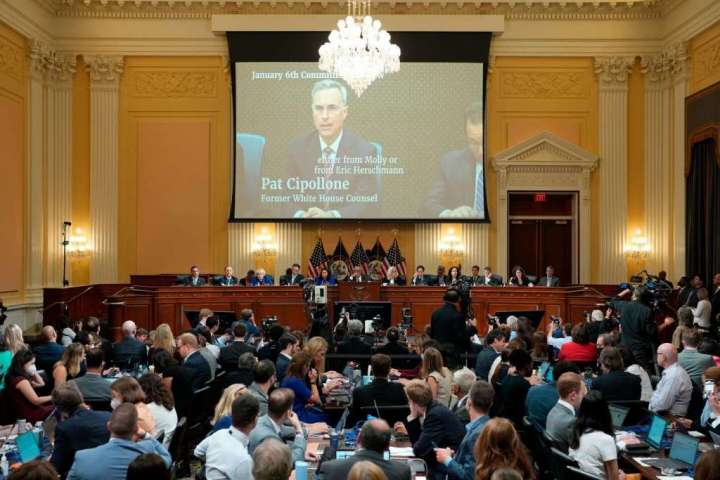If the Jan. 6 committee featured a prosecution and defense, much time and effort could have been spared Tuesday with both sides stipulating that right-wing extremist groups are bad and that they played a significant role in the U.S. Capitol incursion of Jan. 6, 2021.
Let’s admit it: The Jan. 6 committee isn’t uncovering anything new

But the effort to connect Trump to some grand conspiracy involving a shadowy network of fanatical backyard warriors and armchair militants is a bridge too far. It risks making him seem a victim of this overzealous and partisan committee, as evidenced by a new New York Times/Siena College poll showing Trump in a virtual dead heat with President Biden in a hypothetical 2024 rematch — a reality check in the midst of these “bombshell” hearings.
The effort to link Trump to the actions of militant groups, such as the Proud Boys and the Oath Keepers, continues to fall flat. On Tuesday, the committee failed to demonstrate any direct coordination beyond the delusions of the militia members and right-wing media personalities. Likewise, the video testimony of former White House counsel Pat Cipollone provided nothing new; it has long been known that he quickly accepted the election results and tried to persuade Trump to do the same.
One felt sympathy for the live witnesses who were mercilessly used by the committee. The first, Jason Van Tatenhove, is a former member of the Oath Keepers who had no involvement in Jan. 6 and therefore no material testimony to offer. His presence was apparently to provide a warning to everyone to stay away from groups like the Oath Keepers and to allow him to share his opinions of the danger he thinks Trump poses for the future. Duly noted.
The second was a sadder case. Stephen Ayres was a Trump supporter from northeastern Ohio who came to Washington on Jan. 6 to support the president but who — like many who find themselves facing criminal charges — now regrets his actions. His testimony offered a cautionary tale — but mostly on the dangers of getting caught up in the dark hole of social media addiction.
Of all the Trump tweets and sound bites routinely rolled out by the committee, it’s revealing that this part of Trump’s address to the Ellipse crowd on Jan. 6, 2021, is never presented: “I know that everyone here will soon be marching over to the Capitol building to peacefully and patriotically make your voices heard.” On Tuesday, Trump’s replayed remarks were abruptly clipped just before he delivered that line once again. Why? Because Trump’s call to march peacefully to the Capitol undermines the narrative. Likewise, the sloppily edited video testimony of others is suspiciously clipped, sometimes midsentence. Someday, it will be informative to watch it in toto.
The case against Trump is often focused on “things Trump almost did,” such as ordering the seizure of voting machines or appointing Sidney Powell as a special counsel. The committee also enjoys presenting salacious tidbits of information for the purposes of titillation. In the last hearing, it was a tale — later contested — of Trump grabbing a steering wheel and lunging for a person’s throat while demanding to be taken to the Capitol. On Tuesday, it was a Dec. 18 White House meeting featuring a screaming match and a near-physical altercation over how far to go to contest the election. Lots of sound and fury in both cases, but in the end they signify nothing.
Van Tatenhove did offer one good piece of advice: We need to quit mincing words and call things what they are. In that spirit, let’s acknowledge that this politically slanted committee is designed for the sole purpose of indicting Trump and his supporters — first in the realm of public opinion and then by motivating the Justice Department to bring charges. With such a clear agenda, the committee is cheered by those who already despise Trump but dismissed as a partisan witch hunt by Trump’s followers, who are ignoring the hearings.
Some of the committee’s supporters concede that it is not uncovering truly revelatory information but still defend its work as meticulously constructing an official record of events. Fine. But when an unfolding mystery was being unraveled by a much less biased Watergate committee in 1973, about 75 percent of American households watched at least some of the hearings. This one-sided record-building exercise pales in comparison: Only 13 million Americans (out of nearly 330 million) tuned in for the “bombshell” Cassidy Hutchinson testimony. Seems about right.






